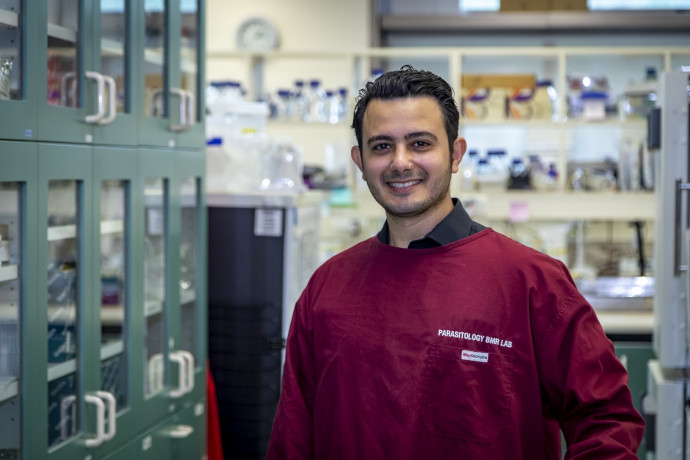Dr Remy Muhsin

With civil war in Yemen, Remy Muhsin has made a new life in New Zealand. Driven by a love of biology, Whitinga funding has helped him set up a new laboratory at the Department of Microbiology and Immunology, University of Otago, to explore an overlooked area of microbiology.
Q. Tell us about your research.
We work on intestinal parasites called cryptosporidium. It’s really hard to get rid of, and surprisingly, the cases here in New Zealand are really high every year. It affects the agricultural sector and people, with cases spiking from the calving and lambing season.
Fortunately, we have a good healthcare system and water treatment, so mortality is really rare here, but in the developing world it’s a totally different story. In fact, it’s one of the major killers of children under two. There’s only one drug that is currently available, but it barely works on children because they don’t have strong immune systems. We’re trying to develop a potent drug against that parasite.
Q. You’re originally from Yemen, what brought you to New Zealand?
My passion is research biology, and I came to New Zealand as an undergraduate in 2009 to do Biomedical Science in Infection and Immunity, I’m really fortunate that my family supported me to study abroad, because I love the science of biology. I was fortunate to get a PhD scholarship from the University of Otago, which was really nice, because my family could stop worrying about me financially.
While I’ve been studying, there’s been civil war in Yemen. I’ve not been able to go home in nine years. I met my wife in New Zealand, and I want to introduce her to my family, but it’s not yet possible for us to enter Yemen. There’s not even an airport as it was bombed from day one. We waited and waited to get married, but the war wasn’t going away. We had a small wedding during Covid, and we’re pretty much happy, but I cannot wait to visit my family, hopefully soon.
Q. What got you started in your research?
After a long PhD and one-year post-doc fellowship in cancer and immunotherapy, I wanted to try something different, that’s when the parasitology field opened up. I joined Professor Bruce Russell’s malaria lab to look into cryptosporidium, a close relative of malaria. It’s very relevant to New Zealand, as the meat and dairy industry provide perfect conditions.
When I started, Bruce pretty much told me, “Alright, set up your lab, do whatever you want”. He pretty much gave me green light, which was scary in the beginning, but it worked out!
It was a completely new field, and the first year was really hard. We applied for several grants, and I was grateful to get the divisional post-doctoral Fellowship, here at Otago. We were able to culture the parasite in the lab, not in a continuous fashion, but enough for us to start testing drugs.
To keep the lab going, we just continued applying for more grants, including two MBIE grants which unfortunately we were not successful with.
And then Covid struck, which made it even harder for us. Research funding was directed at virology research, and we are doing parasitology research. It was really difficult and we didn’t think we’d be able to continue the work, and the work of our students.
That’s when the MBIE Science Whitinga Fellowship came out, and we were quite excited, and gave it a go, and I’m so fortunate to be one of the successful candidates.
Q. How is your Whitinga Fellowship helping with this?
The Whitinga funding helped our research significantly. Cryptosporidium is a really hard to grow in a lab. One of our main objectives has been to develop an in vitro culture without the use of any animals, which allows us to efficiently develop scans for potential drugs.
Dr Daniel Pletzer provided us with novel compounds, peptoids, which are the focus of this funding. We have students working on different projects around this parasite. For example, Bridgette Lamont, who is my PhD student, is developing a continuous culture for cryptosporidium, and she will genetically modify the parasite and test drugs to see if those drugs work on specific genes of the parasite. Masters student Saffron Whitta, did a fantastic thesis on clinical drug comparisons on cryptosporidium in the field.
Q. What’s next?
Now we’re progressing testing novel compounds against the growth of this parasite, and also growth at the different life stages of this parasite. The next step is to move to bigger field trials. What this funding has allowed us to do is to get closer to the clinical trial stage, which is very exciting. We’ll be able to test these compounds, and hopefully work with any collaborators that are willing to pitch in.
Ultimately, we want a drug that targets the parasite at every life stage that it’s going through, so we can stop transmission into other host, and stop cryptosporidiosis from being one of the main notifiable diseases in New Zealand. We hope to acquire more funding as much is yet to be uncovered about this parasite if we are to eradicate it.
Q. What message do you have for other early career researchers?
Science is the study of the universe no matter what you are pursuing. Observing a galaxy or a parasite for knowledge is the most rewarding path a person can take. You literally are unlocking mysteries of nature and that is very fulfilling.
Exploring all opportunities and fields is also important, I studied cancer and now work with an intestinal parasite, your curiosity is the limit!
Applying to all available grants is key. In the end, all you need is the one grant to start pursuing your passion.
